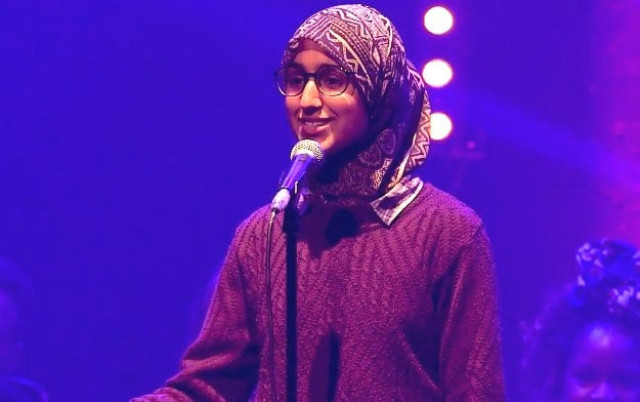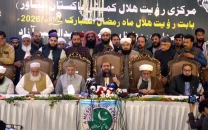British-Pakistani poet opens up about inspiration behind viral poem
Maznoor-Khan's poem has gotten international attention from media and love from Muslims all over the world

Suhaiymah Manzoor-Khan at The Last Word Festival 2017 - Poetry Slam Final. PHOTO: YouTube
With Islamophobia on the rise in the US and different regions of Europe, many Muslims have to go to painful lengths to defend their faith and to separate Islam from extremist versions and fringes. Great efforts have to be invested to showcase members of the Muslim community who are ‘humans’ like the rest, and that is a problem, according to Suhaiymah Manzoor-Khan.
22-year-old British-Pakistani slam poet tears into Islamophobia with powerful words
Speaking to The Express Tribune about her latest poem “This Is Not A Humanising Poem" which she performed at The Last Word Festival 2017 – Poetry Slam Final in June organised by a London-based charity Roundhouse, Manzoor-Khan shared her feelings towards the negative stigma attached to Muslims in Western communities.
When asked about her inspiration behind the poem, she said, “I basically wrote this poem because, as I allude to in the poem, I was sick of writing, or at least reading, about Muslims in this dichotomy where we're either suspicious, criminal, or victims and heroes. That's not a dichotomy that allows for all the nuances of life.” There has been a rise in hate crimes against Muslims and hate speech towards the followers of Islam.
“And it’s just as dehumanising to only ever be recognised when you contribute something deemed 'valuable' to British society,” she added expressing her sentiment towards the treatment of Muslims in Britain. The 22-year-old expressed her distaste for Muslims to only be humanised in positive aspects and to prove that “[one] is against the bad Muslims”.
“I hate the bad/good, liberal/conservative and moderate/extreme Muslim binaries that the Western media, global political rhetoric and government policy has created. I don't exist in those binaries and I don't believe anyone really does unless, in my context, they've allowed the British state to co-opt them to its own ends -- to justify the vilification and policing of Muslims”, she added.
When asked about the medium of slam poetry and why she opted for it, she stated, “I think poetry allows me to capture the contradictions and nuances of feeling in a way other forms of writing and communication don't necessarily enable me to express. The thing about slam poetry too is that everyone has to listen to you for those 3 minutes and it's so rare to get that kind of stage really that I felt I should use it to say something important and complex that I feel. Since slam poetry is so visual I know the first thing an audience sees is that I'm a Muslim woman, so I often try to play on that or provoke using that.”
Speaking of her experience as a 22-year-old, brown, Muslim woman in London, she said, "Being a brown Muslim woman in the UK has become an increasingly scary thing to be, I can't lie. Being visibly Muslim has made women easy targets of Islamophobic violence and I do have to say I feel it." Referring to an acid attack on a girl in London recently she said she feels 'increasingly weary'.
Manzoor-Khan also had a message for Muslims all over the world, and for other Muslim women who stand at intersections of oppression. “I guess if I could say something it would just be, solidarity to you and power. Stand up for truth and injustice wherever it may be and whoever it may be for. If you have a platform or privilege or access to [tools of] power then use it in a way that does not only benefit yourself [but others too]. Have Imaan and assist the rage of the oppressed,” she said.
UK arrests three as footage of London Bridge attack appears online
“So that's why I was compelled to write it really - the final push was the London Bridge incident and a tweet about how Muslim taxi drivers were giving free rides home. Of course they were. The fact it had to be stated was heart-breaking and dehumanising and understandable all at once. That's what I wanted to capture in this poem. That we're human even when you don't notice us, and to highlight the unfair burden and expectation of proof placed upon us,” she explained.
To conclude, the SOAS student said, “Let us have sabr but also strive on.”
You can contribute to Manzoor-Khan's education here: https://www.paypal.me/thebrownhijabi



















COMMENTS
Comments are moderated and generally will be posted if they are on-topic and not abusive.
For more information, please see our Comments FAQ